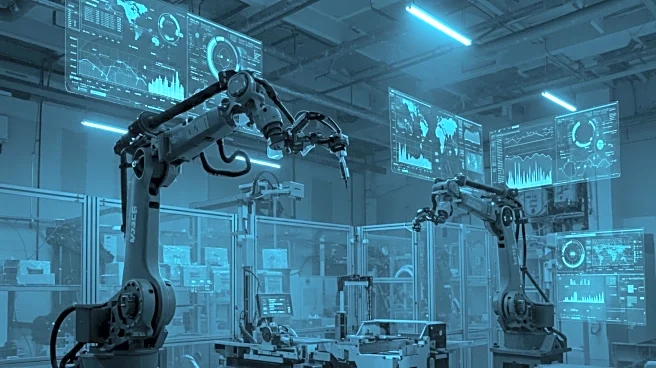What is the story about?
What's Happening?
Guizhou Province in China is transitioning from traditional chemical industries to intelligent manufacturing by leveraging new digital infrastructure. This shift involves integrating massive industrial data into a digital economic network powered by computing and algorithms. The province is enhancing smart logistics networks, improving production lines, and developing new energy vehicle clusters to transform its manufacturing sector into a high-end, intelligent, and green industry. Key players like Guizhou Phosphorus Chemical Group and Guiyang Hisense Electronics are utilizing digital technologies to optimize operations and increase efficiency. Geely Auto's manufacturing base in Guiyang is also adopting intelligent systems for rapid production of electric vehicles, contributing to a comprehensive ecosystem of vehicle and auto parts manufacturing.
Why It's Important?
The transformation in Guizhou represents a significant shift towards digitalization in manufacturing, which can serve as a model for other regions aiming to upgrade their industrial capabilities. By adopting intelligent manufacturing practices, Guizhou is enhancing its competitiveness in the global market, particularly in sectors like electronics and automotive. This development is crucial for economic growth, as it increases production capacity and revenue, while also fostering innovation and sustainability. The integration of digital infrastructure in manufacturing processes can lead to more efficient supply chains, reduced costs, and improved product quality, benefiting both local industries and international trade partners.
What's Next?
Guizhou's ongoing digital transformation is expected to continue, with plans to further upgrade logistics systems and integrate big data for intelligent decision-making. The province aims to expand its intelligent manufacturing capacity, potentially attracting more investment and partnerships. As digital infrastructure becomes more entrenched, Guizhou could see increased collaboration with other regions and countries, enhancing its role in the global supply chain. The success of this initiative may prompt other provinces to adopt similar strategies, leading to widespread industrial modernization across China.
Beyond the Headlines
The shift towards intelligent manufacturing in Guizhou highlights broader trends in industrial digitalization, which could have long-term implications for labor markets and environmental sustainability. As automation and digital technologies become more prevalent, there may be a need for workforce retraining and adaptation to new roles. Additionally, the focus on green development aligns with global efforts to reduce carbon emissions and promote sustainable practices, potentially influencing policy decisions and corporate strategies worldwide.
















